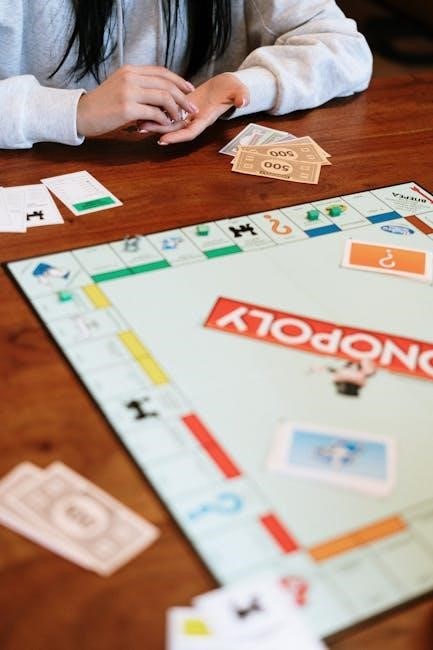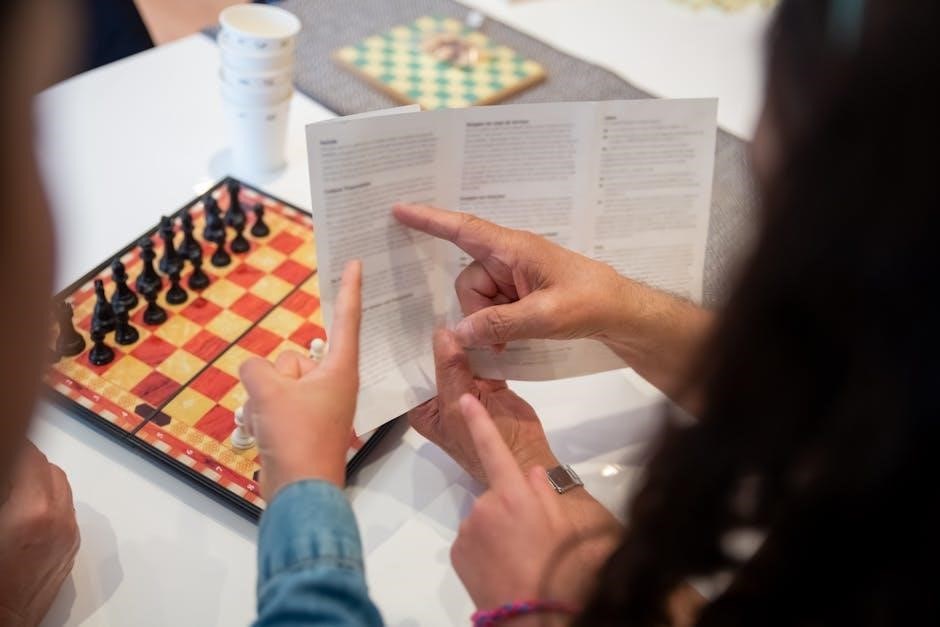coup rules pdf
Summary
Download the official Coup rules PDF and learn how to strategize, manipulate, and win every game. Get the complete guide now!

Coup is a strategic card game where players manipulate influence and resources to eliminate opponents․ The official Coup Rules PDF guides setup, actions, and winning conditions, ensuring clarity for all players․
Overview of the Game
Coup is a fast-paced, strategic card game set in a dystopian future where players compete to eliminate opponents and gain absolute power․ Designed for 3-6 players, the game revolves around manipulating influence, bluffing, and managing resources․ Each player starts with two face-down influence cards and two coins, using actions like income, foreign aid, and coups to outwit rivals․ The deck includes 15 character cards with unique abilities, adding depth to gameplay․
Importance of Understanding the Rules
Importance of Understanding the Rules
Understanding the Coup rules is crucial for strategic gameplay․ Players must grasp character abilities, actions, and challenges to navigate the game effectively․ Misunderstanding rules can lead to incorrect moves, influencing the outcome․ Familiarize yourself with bluffing, deductions, and counteractions to maximize your chances of success․ Adhering to the rules ensures fair play and enhances the overall experience for all participants in this intricate, strategic game․

Setup and Initial Requirements
Shuffle the deck and deal two influence cards to each player․ Each player starts with two coins and keeps their cards face down․ The remaining cards form the Court deck․
Number of Players and Deck Preparation
Coup is designed for 3-6 players․ The deck consists of 15 influence cards, with three copies of five distinct characters․ For setup, shuffle the deck and deal two cards to each player․ In a two-player game, divide the deck into three sets of five cards, each containing one of each character․ This ensures balanced gameplay and fair distribution of influence for all participants․
Dealing Cards and Starting Wealth
Each player begins by receiving two face-down influence cards․ These cards represent their hidden influence at court and must remain secret․ Players also start with two coins, which are kept visible․ The remaining cards form the Court deck, placed face down in the center․ In two-player games, the setup adjusts by dividing the deck into three equal sets, ensuring each player has a balanced starting influence․ Starting wealth is crucial for early actions․

Objective of the Game
The objective is to be the last player standing by eliminating all opponents․ The game ends when only one player remains with influence, securing victory․
Eliminating Opponents
Players eliminate opponents by forcing them to lose influence, represented by face-down character cards․ Actions like Coup (costing 7 coins) or Assassination (costing 3 coins) target opponents, making them reveal and discard a card․ If a player loses all influence, they are exiled․ The goal is to strategically use these actions to outmaneuver rivals and remain the last player standing with influence intact․
Winning Conditions
The game concludes when only one player remains with influence․ Players are eliminated when they lose all face-down character cards, exiting the game․ To achieve victory, you must strategically manipulate actions like coups and assassinations to reduce others’ influence․ The last player standing, with at least one influence card, is declared the winner, solidifying their dominance in the corrupt government hierarchy․

Core Actions in Coup
Core actions include Income, Foreign Aid, Taxes, Coup, Assassination, Stealing, and Exchange․ Each action has specific costs and effects, enabling players to manipulate resources and influence effectively․
Income, Foreign Aid, and Taxes
Income allows players to take 1 coin from the Treasury, a basic action to build resources․ Foreign Aid grants 2 coins but can be blocked by the Duke․ Taxes, using the Duke’s ability, enable taking 3 coins, a powerful move to gain wealth quickly․
These actions are fundamental for resource management and can be challenged, adding strategic depth and bluffing opportunities in the game․
Coup and Assassination
A Coup costs 7 coins, allowing you to target another player and force them to lose an influence․ This action cannot be challenged or blocked․ If a player starts their turn with 10 or more coins, they must launch a Coup as their only action․
Assassination costs 3 coins to target another player, forcing them to lose an influence․ However, this can be blocked by the Contessa․ Both actions are powerful tools for eliminating opponents and gaining an advantage in the game․

Challenges and Counteractions
Challenges and counteractions add depth to the game, allowing players to question or block actions․ These mechanics promote bluffing and strategic thinking, making each move unpredictable and engaging․
Bluffing and Challenging Actions
Bluffing is a core element in Coup, as players can claim influence over characters they don’t possess․ Challenging actions allows others to call out potential lies, adding a layer of deduction․ If a challenge succeeds, the bluffing player loses an influence․ Conversely, a failed challenge punishes the challenger, creating a dynamic of risk and reward that enhances the game’s strategic depth and player interaction․
Resolving Challenges
When a challenge is issued, the accused must reveal the relevant character card if they possess it․ If they fail to prove their claim, they lose an influence․ If they succeed, the challenger loses one influence instead․ This mechanic ensures accountability while maintaining the game’s balance, as players must weigh the risks of bluffing against the potential consequences of being exposed or falsely accusing others․

Two-Player Variant
The two-player version adapts the game with a special setup, dividing cards into three sets․ Each player selects one card, creating a unique dynamic for two players․
Special Setup for Two Players
In the two-player variant, the deck is divided into three sets of five cards each, ensuring each set contains one of every character․ Players secretly choose one card from their set and discard the rest․ The remaining cards form the court deck․ Each player starts with one coin instead of two, adapting the game for a dynamic two-player experience while maintaining the core strategic elements of Coup․

Adaptations to the Rules
For two-player games, the deck is divided into three sets of five cards, each containing one of every character․ Players secretly choose one card from their set and discard the rest․ The remaining cards form the court deck․ Each player starts with one coin instead of two, and the court deck is shuffled to deal one card to each player․ This setup ensures a balanced and dynamic two-player experience while retaining the core strategic elements of Coup․

Winning the Game
Coup concludes when only one player remains with influence, making them the winner․ The game ends immediately upon the elimination of all other players, securing victory for the last standing ruler․
Last Player Standing
Coup ends when only one player retains influence, achieved by eliminating all opponents․ Players lose influence when their cards are revealed or discarded․ The last remaining player, with at least one face-down card, wins the game and claims dominance․
Endgame Scenarios
The game concludes when only one player remains with influence cards․ A player is eliminated when both their cards are revealed․ If a player starts their turn with 10 or more coins, they must launch a Coup, accelerating the endgame․ The last player standing, with any influence card, wins, ensuring their dominance in the corrupt government․

Strategies and Tips
Mastering character abilities and bluffing effectively enhances gameplay․ Manage resources wisely, as excessive coins can force a Coup․ Deduce opponents’ moves to counteract their strategies and maintain influence until the end․
Mastering Character Abilities
Each character in Coup offers unique abilities that can shift the game’s dynamics․ The Duke allows tax collection, the Assassin enables targeted attacks, and the Captain facilitates stealing․ Understanding these roles is crucial for strategic play․ Use the Duke to gain coins, the Assassin to eliminate threats, and the Captain to disrupt opponents․ Mastering these abilities ensures you can adapt to any situation and maintain control over the game․
Bluffing and Deduction Tactics
In Coup, bluffing and deduction are essential for outsmarting opponents․ Players can falsely claim character abilities to deceive others, while deduction involves analyzing actions to uncover hidden cards․ Mastering these tactics allows you to manipulate the game flow, protect your influence, and mislead rivals․ A well-timed bluff can deter challenges, while accurate deductions can expose opponents’ lies, giving you a strategic edge in eliminating threats and securing victory․

Expansions and Variations
The Coup universe expands with Reformation, adding Allegiances for team-based play, and other optional rules․ These variations enhance gameplay depth and offer fresh strategies for experienced players․
Reformation and Other Expansions
The Reformation expansion introduces Allegiances, enabling team-based play and new strategic dynamics․ It requires the base Coup game and adds fresh mechanics, refreshing the gameplay experience․ Optional rules and additional expansions further enhance replayability, offering players varied ways to enjoy the game with new modules and strategies for experienced players seeking complexity and depth․
Optional Rules and Mods
Optional rules and mods enhance Coup’s flexibility, allowing players to customize gameplay․ Examples include the Contessa blocking the Inquisitor or unique character abilities․ Mods introduce new mechanics, such as team play or alternate win conditions, refreshing the experience․ These variations cater to diverse preferences, making each game unique and engaging for experienced players seeking new challenges and strategic depth․